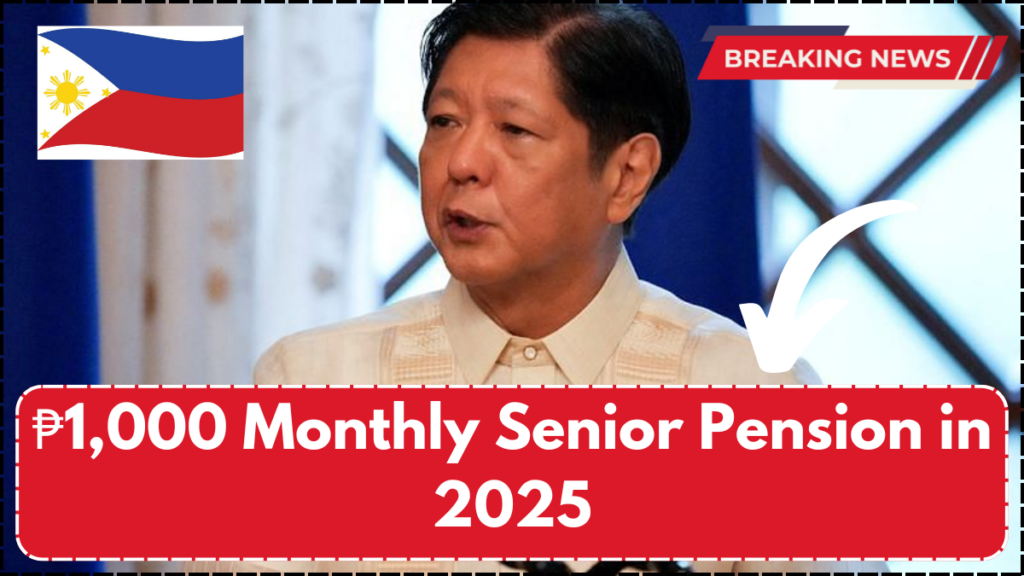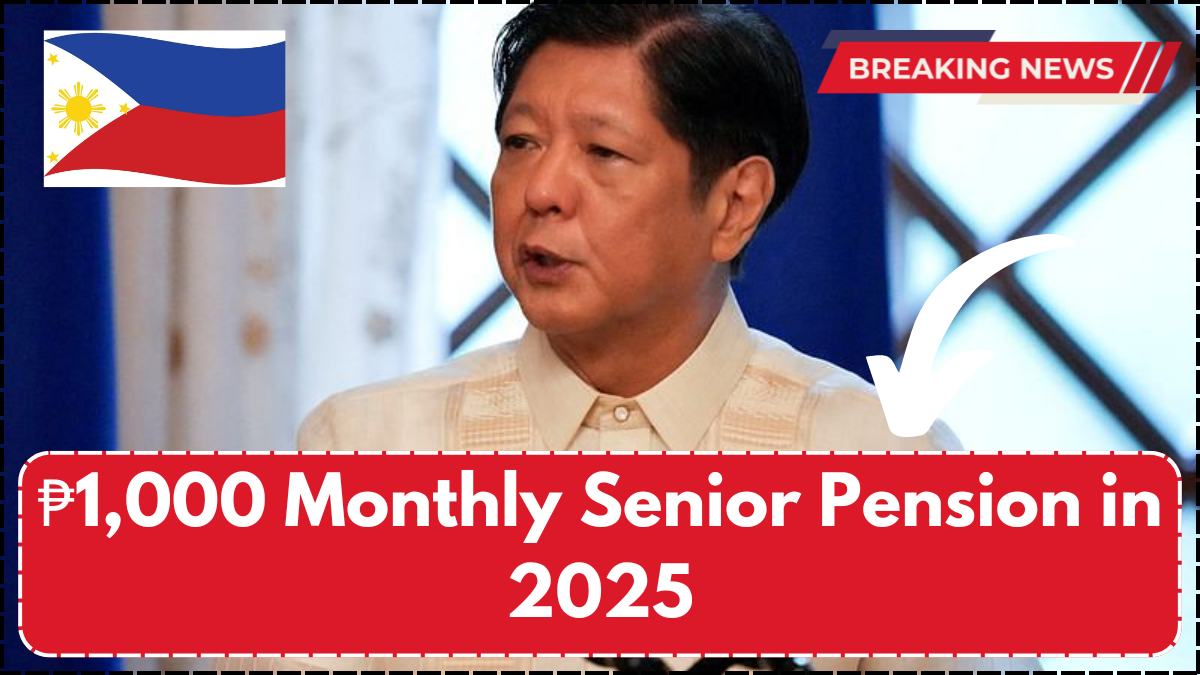Many Filipinos assume that all senior citizens automatically receive a government-provided ₱1,000 monthly pension. This belief has been fueled by misleading social media posts and misinformation. However, the truth is that not all elderly Filipinos qualify for this financial aid.
The Department of Social Welfare and Development (DSWD) is the agency responsible for managing social pensions for indigent senior citizens, but strict eligibility rules apply. This article will clarify the truth about who is eligible, expose false claims, and provide an in-depth guide on how to apply.

Widespread False Claims About Senior Pensions
A viral Facebook post recently misled the public into believing that every Filipino senior would receive a ₱1,000 monthly stipend, regardless of their financial standing. The post further alleged that:
-
The National Commission of Senior Citizens (NCSC) had taken over pension distribution.
-
The Office for Senior Citizens Affairs (OSCA) had merged with the NCSC.
-
Seniors could register online to claim their pension.
These claims were quickly debunked by government agencies, confirming that the DSWD remains the sole authority responsible for the social pension program. Furthermore, the NCSC does not manage pensions, and OSCA continues to operate independently.
Who Qualifies for the ₱1,000 Social Pension?
The DSWD social pension program provides ₱1,000 per month exclusively to indigent senior citizens who meet specific criteria. This financial aid aims to support elderly individuals living in poverty who lack financial assistance from family or government institutions.
Eligibility Requirements
| Criteria | Details |
|---|---|
| Health Condition | The applicant must be frail, sick, or disabled. |
| No Existing Pension | Seniors who are not receiving GSIS, SSS, or private pensions qualify. |
| No Stable Income | The applicant must lack a steady source of income or employment. |
| No Financial Support | Seniors who do not receive help from family members are eligible. |
This pension, introduced under Republic Act 9994, aims to ease the financial burden on the most vulnerable senior citizens. More than four million elderly Filipinos currently benefit from this program.
How is the Pension Distributed?
The disbursement schedule varies by region and is determined by the DSWD, with payments made monthly, bi-monthly, or quarterly. Seniors must verify their eligibility through official DSWD channels to receive their benefits.
Existing Social Pension vs. Proposed Universal Pension
Many assume that the government provides a universal pension to all seniors, but this is incorrect. Currently, the only active program is the Social Pension for Indigent Seniors, which is not available to everyone.
Key Differences Between Pension Programs
| Pension Program | Details |
|---|---|
| Social Pension (SocPen) | Provides ₱1,000 monthly to indigent seniors who meet strict eligibility requirements. |
| Universal Social Pension Bill (House Bill No. 10423) | Proposes a ₱500 monthly pension for all seniors, increasing to ₱1,000 in phases. This bill has not yet been approved. |
As of now, only the Social Pension Program is operational, and the proposed universal pension is still under legislative review.
Government Efforts to Expand Senior Pensions
In an effort to improve financial security for senior citizens, lawmakers have proposed multiple bills advocating for a universal pension system.
-
House Bill No. 10423 was approved in May, suggesting an initial ₱500 monthly pension for all seniors, increasing to ₱1,000 within five years.
-
Senator Risa Hontiveros introduced a separate bill proposing ₱1,500 monthly for all seniors, but it has not progressed since 2022.
At present, no law guarantees a universal pension, meaning only those classified as indigent can receive financial aid from the government.
Busting Myths About Senior Citizen Pensions
There are many misconceptions surrounding senior pensions. Below, we clarify the truth behind the most common myths:
Fact vs. Fiction
| Myth | Reality |
|---|---|
| All seniors receive a ₱1,000 pension. | Only indigent seniors who meet the DSWD’s criteria qualify. |
| Registering with the NCSC guarantees approval. | The NCSC does not distribute pensions; the DSWD handles the program. |
| OSCA and NCSC are now the same agency. | OSCA remains independent under DSWD supervision. |
Dangers of Misinformation
One of the biggest threats to senior citizens is fake news surrounding government benefits. A viral Facebook post falsely promising a ₱1,000 universal pension amassed:
936,000 views
10,800 reactions
5,400 shares
Since 2019, misleading posts have spread rumors about pensions ranging from ₱500 to ₱10,000, causing unnecessary confusion. It is crucial to verify information through official government sources.
How to Apply for the Social Pension Program
If a senior citizen meets the eligibility criteria, they can apply for the indigent pension program by following these steps:
Check Eligibility – Ensure the senior meets the financial and health requirements.
Visit the OSCA Office – Go to the local Office for Senior Citizens Affairs to start the process.
Prepare the Required Documents – These typically include:
-
Proof of age and residency
-
Certificate of indigency
-
Valid senior citizen ID
Submit the Application – The DSWD will review and notify applicants of their approval status.
To avoid scams, applications must be processed in person through official OSCA and DSWD offices.
Frequently Asked Questions (FAQs)
1. Does every senior citizen receive a ₱1,000 pension?
No, only indigent seniors who meet specific DSWD criteria qualify.
2. Can seniors receiving GSIS or SSS pensions apply for the indigent social pension?
No, those already receiving pensions from GSIS, SSS, or private institutions are not eligible.
3. What is the current status of the Universal Pension Bill?
The bill is still under legislative review and has not yet been enacted.
4. Can I apply for the pension online?
No, applications must be submitted in person through OSCA and DSWD offices.
5. How can I verify accurate information about senior benefits?
Always check official sources like DSWD, OSCA, or NCSC to avoid misinformation.
By staying informed and relying on official updates, senior citizens and their families can make well-informed decisions about their financial support options.
For More Information Click Here
Pari is a passionate writer known for captivating stories that blend imagination and reality. Inspired by travel, history, and everyday moments, Pari crafts narratives that resonate deeply with readers.
